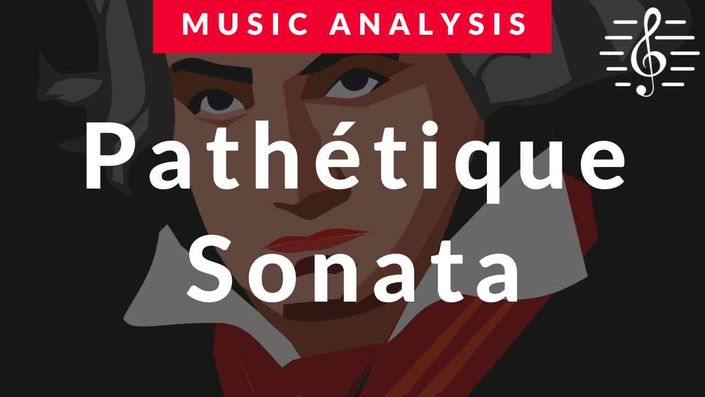
Beethoven's Piano Sonata No.8 in C minor "Pathetique" Analysis
Get inside the mind of Beethoven with this detailed analysis of his much loved "Pathetique" Piano Sonata.
Enroll in Course
What You Will Learn
Gain an insight into this much loved work with this Music Analysis course.
Get inside the mind of Beethoven with this engaging analysis of his much loved "Pathetique" Piano Sonata. A valuable resource for students studying or performing this fantastic work, each movement is covered in depth, looking at the various harmonic devices, keys, use of thematic ideas, structural devices and other techniques employed by Beethoven in this masterpiece. The course is designed not only to focus on this work but also to equip recipients in the art of musical analysis. During this music analysis course we'll cover...
- Internal and External Structures - What is the structure of each movement? When does Beethoven break convention? How does he bring off structural surprises?
- Thematic Ideas - What are the main themes of the piece? How does Beethoven effect contrast and unity between themes? How does Beethoven link the three movements?
- Harmonic Analysis - How does Beethoven use diatonic and chromatic chords in colourful ways to add character and drama? What is the key structure of each of the movements? What follows Classical convention and what is prophetic of the later Romantic harmonic language?
- Use of Texture - How does Beethoven use the resources of the piano to the full? How does he blend homophonic and contrapuntal textures? How does he contrast thick textures with thin textures?
- Expressive Detail - How does Beethoven employ tempo, dynamics, phrasing, and articulation to paint the structure and internal framework of the movements? How does he make particular use of his hallmark unexpected sf markings? How might the performer add rubato to draw out compositional features?
Absolutely fascinating. I’ve played this piece for years but there are so many details I had missed. Having done this course I appreciate so much more about the piece and it’s helped me to play it in a much more convincing way. I’ve also found that I more easily see what’s going on in other pieces I play. More of these please...!
- Tony

Who Is This Course For?
Performers learning the work and students who want to explore the genius of Beethoven.
The benefits of music analysis are often overlooked by students. Delving into such a fabulous piece in great detail allows us get an idea of what was going on in Beethoven's mind, highlighting the inner workings of a piece, giving us greater knowledge and ideas that we can apply in either performance or our own compositions. This music analysis course is designed to develop both your general analysis skills and bring to your attention various harmonic, melodic, structural and expressive devices that Beethoven has employed during this piece. Learning the skill of music analysis is an excellent way to incorporate an extra flourish into your performance or make strides in composition.
Do any of these sound familiar?
"I want to know more about how Beethoven writes for the piano..." "I’m learning this piece but would like to know more about the structure, the keys, chords and modulations, and other things I need to draw out in my playing..." "I want to know more about Beethoven’s style…" "I love playing but I want to get better at analysing the music..." "I want to know more about why Beethoven is called the ‘bridge composer’…"
↓
This course is great! Like all the other courses I took before this one, the subject matter is carefully and logically laid out such that each lesson builds upon material presented in the previous lesson.
- Carl

By the end of this Music Analysis course you'll be able to…

Perceive how each movement of this work is structured and how the thematic material is used

Understand the entire harmonic language of the work, along with the keys and modulation schemes

Reflect on new ideas for interpretation of the piece

Understand how and why Beethoven varies his use of piano textures

Feel more confident about your analytical skills

Clearly define what constitutes Beethoven’s style
A fabulous course - so well explained and very clearly presented. This was a refresher course for me and I couldn't help thinking - if only this piece had been explained this clearly the first time around!
- Bev

Course Information
What's Included with this Music Analysis Course?
Professional Teaching
You'll receive expert teaching, highlighting the complete inner workings of the piece and the reasonings behind them.
Musical Explanation
All the analytical aspects are explained in great detail, with the piece being slowly played so you can relate everything to sound.
Ask Questions
Below each video you are able to post comments and ask questions should you have any in regards to the course topics covered.
Easy to Follow Structure
The course is divided into multiple stages, breaking down each part separately before putting it all together.
Complete at Your Own Pace
You can easily fit the course around your regular commitments, completing it at your own pace and in your own time.
Anywhere Access
Your course never expires. Learn when and where you choose! Computer or mobile. Just get comfortable and dive in!
↓
Your Instructor

Hi, I’m Gareth and I'm passionate about developing ‘the all round musician’.
Over 35 years of music examining with ABRSM, work with the BBC on Radio and TV, experience on the international concert platform, as a published composer and arranger, have brought rich resources to the 40 years of teaching in which I've engaged.
Scholarships at The Royal College of Music, Oxford University and St. Paul’s Cathedral gave me fantastic opportunities to learn from the best musicians, scholars and teachers. Working as Director of Music at Queen Elizabeth Grammar School then provided a wonderful opportunity to develop my teaching skills.
Teaching individuals and groups of all ages, and at all stages of development have refined a teaching approach that I hope is fun and engaging, and focused on explaining things clearly and logically. And that is what these courses are all about - understanding the basic principles with clarity, then going deeper, applying them to your musical life and liberating yourself as a musician.
It’s a rich and amazing journey, and I can’t wait for you to join me today!
Course Curriculum
-
PreviewLesson 1 - Introduction (7:27)
-
StartLesson 2 - 1st Movement; Grave Sections (50:54)
-
StartLesson 3 - 1st Movement; First Allegro Section (33:03)
-
StartLesson 4 - 1st Movement; Second Allegro Section (24:58)
-
StartLesson 5 - 2nd Movement; Adagio (51:35)
-
StartLesson 6 - 3rd Movement; Rondo (47:44)
Frequently Asked Questions
A Letter from Gareth Green
MA (Oxon), MA (Leeds), FRCO(CHM), FLCM, ARCM
Whenever the word ‘analysis’ comes up, many people groan with despair. ‘Analysis’ sounds really dry and academic. Let me put it to you another way. How would you like to get inside the mind of Beethoven? For me that’s the real excitement of analysis.
As we work our way through this landmark Piano Sonata in Beethoven’s output we will start with grasping the overall structure of each movement, working out what might be expected and how Beethoven embraces some unexpected changes to the norms. We will unpack the nature of the thematic ideas, how they are constructed melodically and rhythmically, and how the player might draw out the characteristics of these themes. We will explore how the thematic ideas are developed as each movement unfolds, and we will take a detailed look at Beethoven’s use of keys, modulations, chord choices, and harmonic progressions. We will also consider his varied use of piano textures and how expressive detail is added in order to enhance particular features of the writing.
The deeper you go, the more you will enter the mind of the composer, the more you will understand about the piece, the more ideas you will have for interpretation, and the more you will grasp Beethoven’s style.
A friend of mine is a well known Concert Pianist on the international stage, who has been playing Beethoven all his life. He is so ‘in tune’ with Beethoven that he senses Beethoven talking to him regularly about how to play the music. That will sound strange to some but to me it’s an indication of how he is so soaked in the music, in the playing of it, and in the analytical thinking that lies behind it, that he really has entered the mind of Beethoven. Does that sound dry and academic or does it sound like the most exciting thing a musician could dream for? If the latter connects with you join me as we explore this fantastic work together.
— Gareth Green, Music Matters




